I attended the Digital Wellness Festival in London 3-4 May 2019 to see how people involved in the digital tech industry were approaching wellbeing. As someone who is keen to improve my own wellbeing and help others to do the same, I am often tempted to believe that the answer lies in stripping away as much technology as possible.
At the beginning stages in my exploration of how individuals can “automate” their own wellbeing through the use of personalisable wearables, I imagined I might use simple, low-tech and screen-free options in my prototype products. However, I was curious to gain a critical perspective on how technology can positively impact wellbeing so I booked on this conference to see what ideas are out there for responsible, balanced use of technology, and what role it might play in enhancing wellbeing.
Digital Wellness Festival
“Experience best practices, new technologies and future trends in digital wellness”
The event approaches digital wellness from two angles: how digital technologies help and harm our wellbeing. Some of the festival focussed on technology that enhances our wellbeing, for example, meditation apps. Other parts of the festival focussed on how digital technologies can harm our wellbeing, for example, reduced sleep, focus and human contact, and what responsibilities do or should lie with legislators, designers and developers to educate and minimise harm.
Many of the speakers had worked for companies such as Google and Facebook, before leaving due to becoming uncomfortable with the negative wellbeing impacts they were creating, and starting their own technology companies that supported a more balanced approach. Some companies even coach people in how to disconnect from technology.
The event, organised by Digital Mindfulness, was extremely rich in content. Below is what I captured of the event
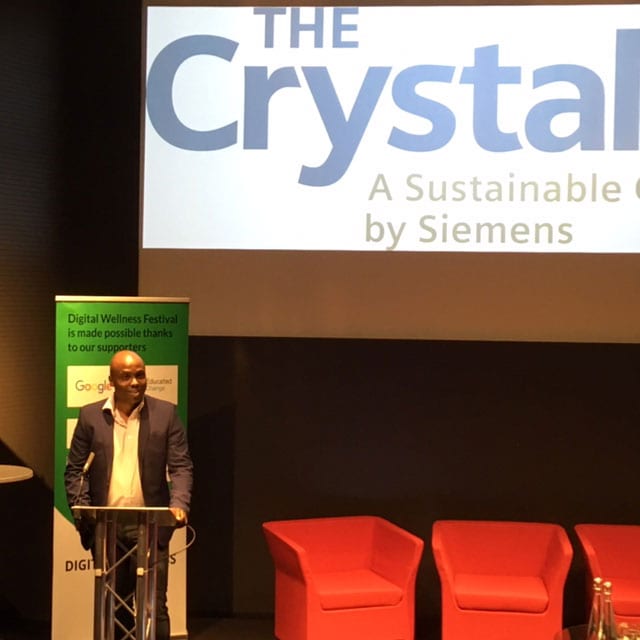
3 May 2019: Talks & Panel Discussions
Talk 1: Ian MacRae – Ofcom: Consumer behaviour in a constantly connected world
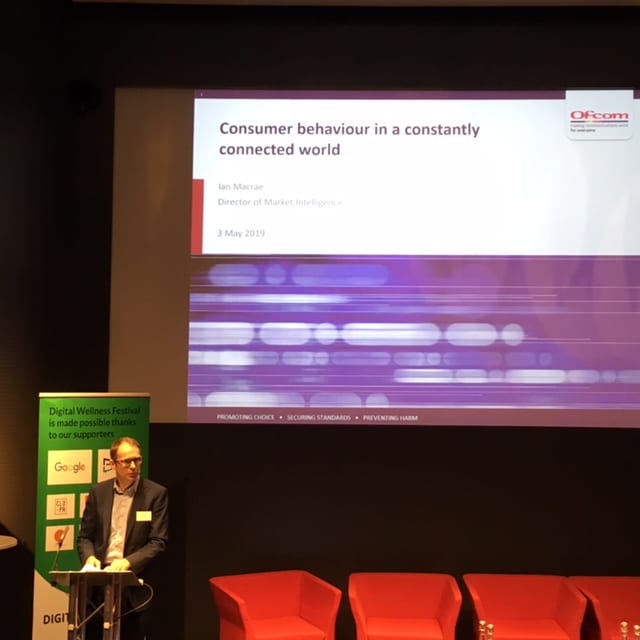
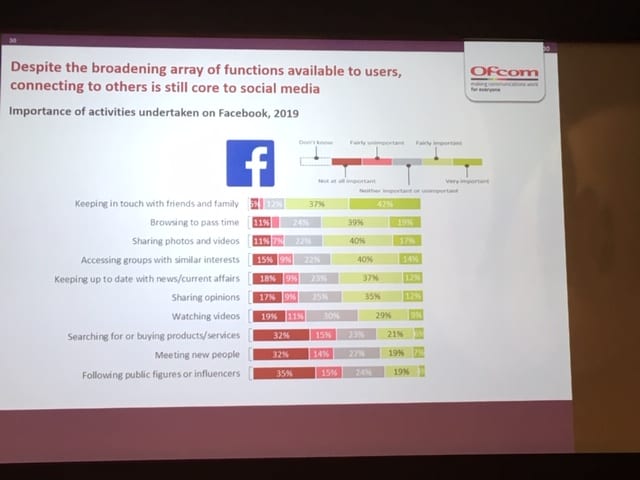
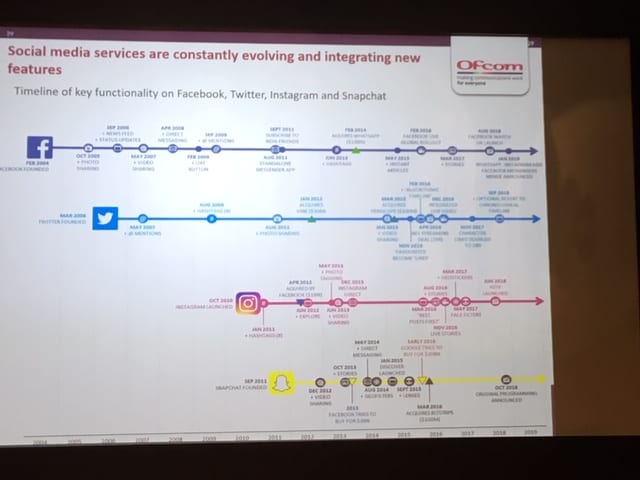
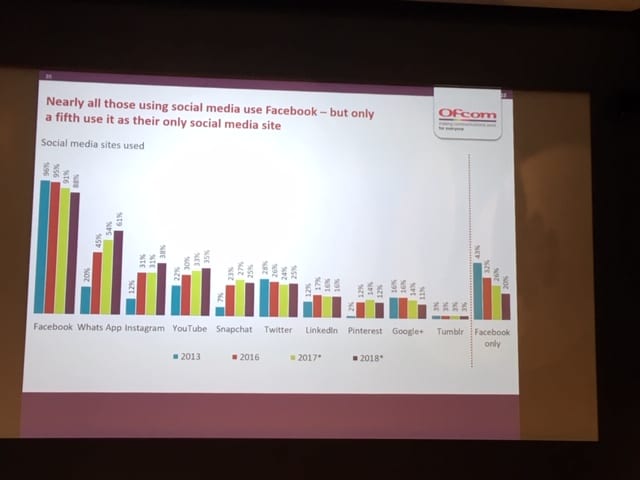
Talk 2: Rose La Prarie – Google: Digital Wellbeing at Google
This talk covered the impacts on sleep, relationships and concentration at work that being constantly connected to a device can bring, and how Google has created a digital wellbeing app for Android to help reduce these impacts – features include turning the phone to grayscale in the late evening to reduce the visual appeal of content.
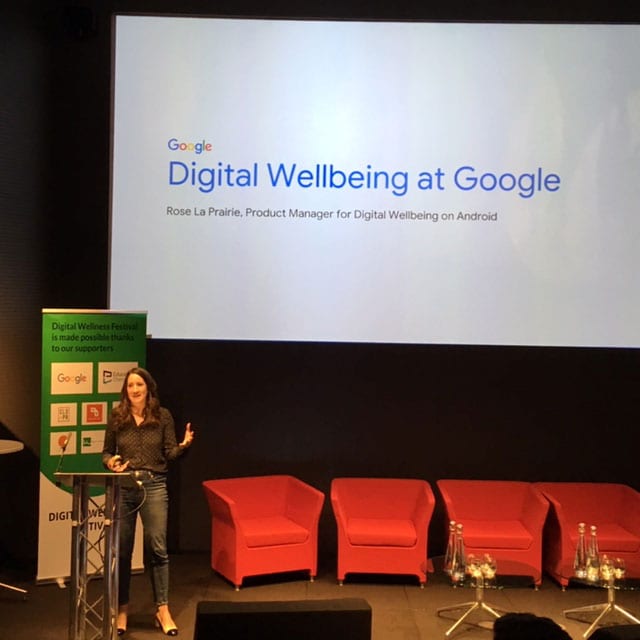
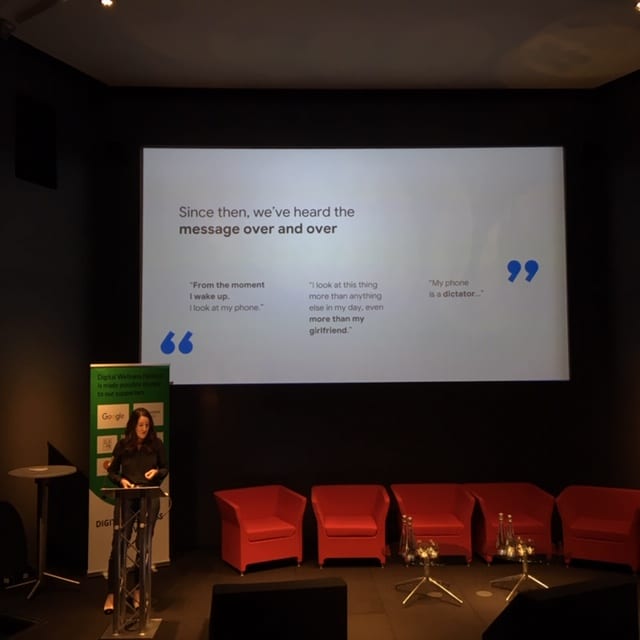
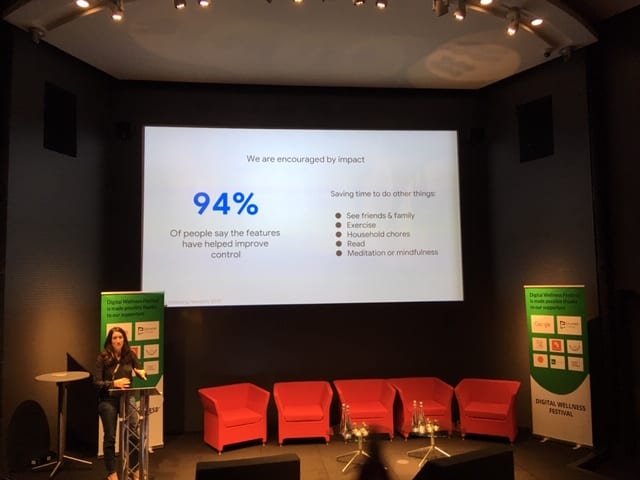
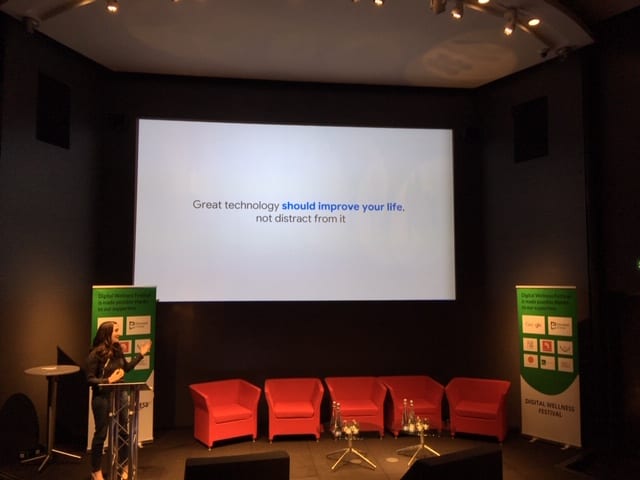
Panel 1: Professor Raian Ali (Bournemouth University), Professor Rafael Calvo (UCL), Dr Anastasia Dedyukhina, James McErlean (Headspace): Digital Addiction: Technology as a Problem, Technology as a Solution
Panel members are involved in what fulfils our psychological needs, positive computing, and how negative outcomes can be reduced and positive outcomes improved. The discussion covered designing technologies that support autonomy, as opposed to those which enslave or are ‘addictive’. In the attention economy, developers and designers are compared to drug dealers who create digital experiences designed to capture and keep our attention. However, intrinsic motivation correlates to wellbeing, so we will feel good if we use something because we decide to versus being compelled to. This will be a key thorny issue for me in the wearable concepts I develop.
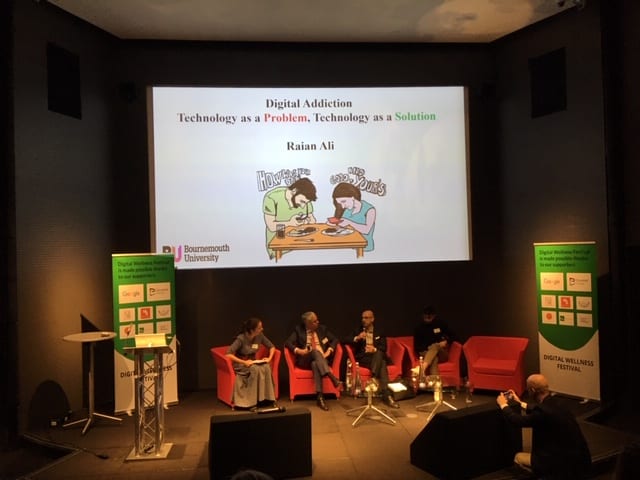
Talk 4: Tim Kendall – Moment
Moment is an app that coaches people to examine their relationship with their phone and build more healthy habits; gaining agency, time and attention. It helps people examine their underlying psychological or emotional causes for using social media platforms. Tim spoke about his professional journey that led him to switch tack from feeding digital engagement to reducing it.
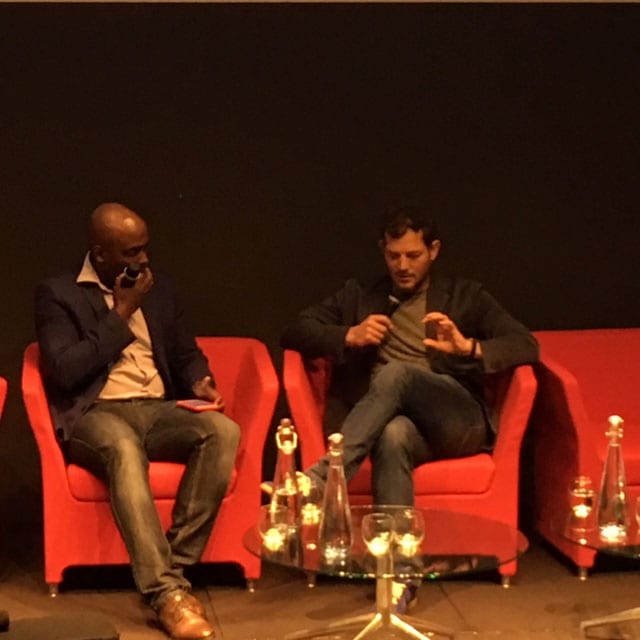
Panel 2: Niraj Shah (Transformative Tech Lab), Kai Tang (Light Phone), Tim Kendall (Moment), Anthony Philips (Wellkom) Peter Klein (Educated Change)
Part of the discussion focuses on how technology can know us better than we know ourselves. Social media platforms use AI to capitalise on willpower weaknesses and target or drive certain behaviours at people’s most vulnerable times of day. Tristan Harris is a thought leader in this area – see https://humanetech.com/ and http://www.tristanharris.com/media-links/ However, AI can also be used to augment a person’s self-control and willpower.
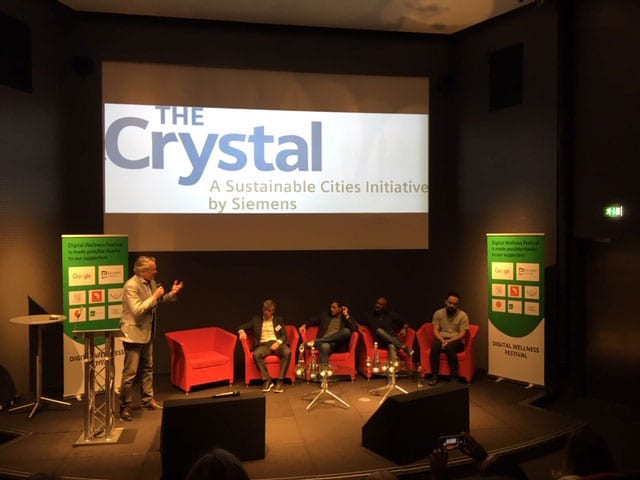
Talk 5: Anthony Philips (Wellkom): Guaranteed, Proven and Validated Digital Health Solutions to Improve Performance – Engagement – Wellness
An overview of an impressive and highly personalised system for managing and improving employee wellbeing, considering the whole person and lifestyle, and positively impacting motivation, performance and wellness. Due to its holistic and highly personalised approach, it is something I would consider using in my own business.
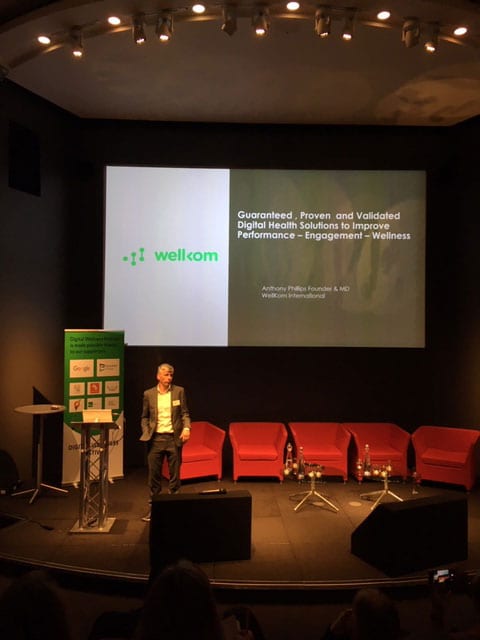
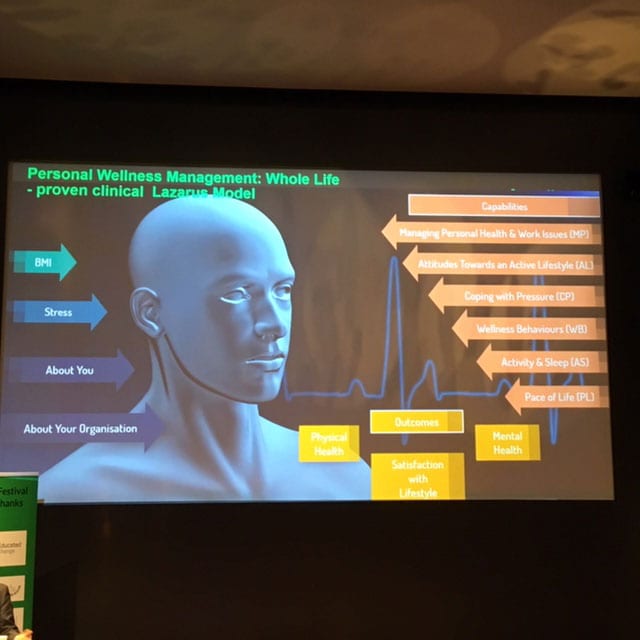
Talk 6: Janice Taylor (Mazu): The Battle for Your Mind: Waking Up from the SlumberJanice works with recovering addicts and had great perspectives to share about addiction, the need to pay for the social media platforms we use (and what we compromise when we don’t). She set up family-friendly social media platform, Mazu.
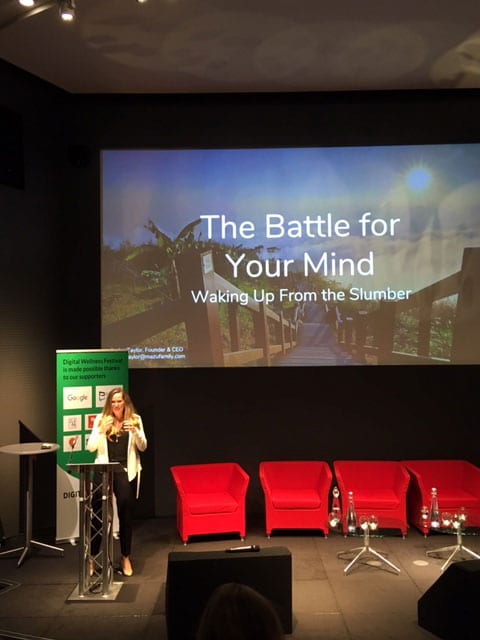
Panel 3: Janice Taylor (Mazu), Victoria Shotbolt (Parentzone), Susan Reynolds (Digital Wellness Collective), Simon Pulestone-Jones (Woken Up), Gary Todd (Famiio)
Talk 7: Jonathan Garner
Jonathan spoke about using digital products with intention rather than through habit. As founder of Mind Over Tech, he enables people to gather “human skills to thrive in a digital world” by examining their digital habits, working on creativity and focus, mindfulness and purpose, communications and relationships.
https://mindovertech.com/
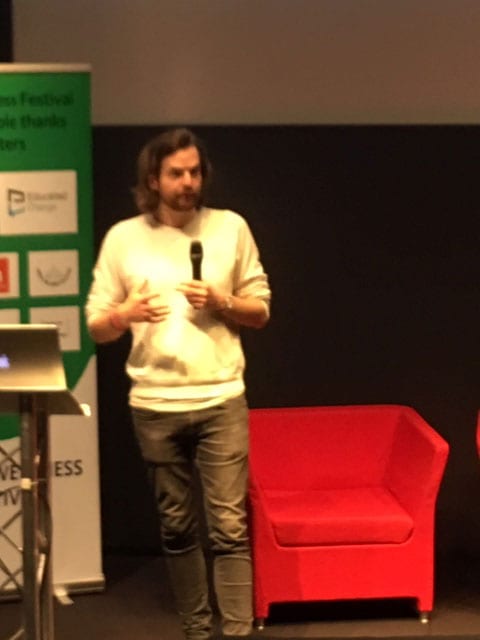
Panel 4: Peter Klein (Educated Change) Aidan Healy (Unplug), Nicky Hemmings (Biobeats)
Nicky spoke about combining the physiological (body), neurological (brain) and psychological (mind) to reduce stress and improve wellbeing through her wearable and app, Bio Beats. Nicky is Bristol-based and I plan to speak to her further to help me develop my thinking during my fellowship.
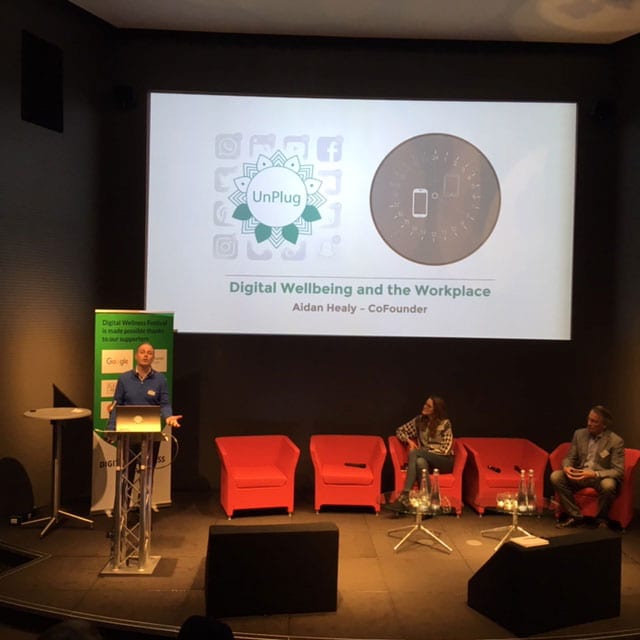
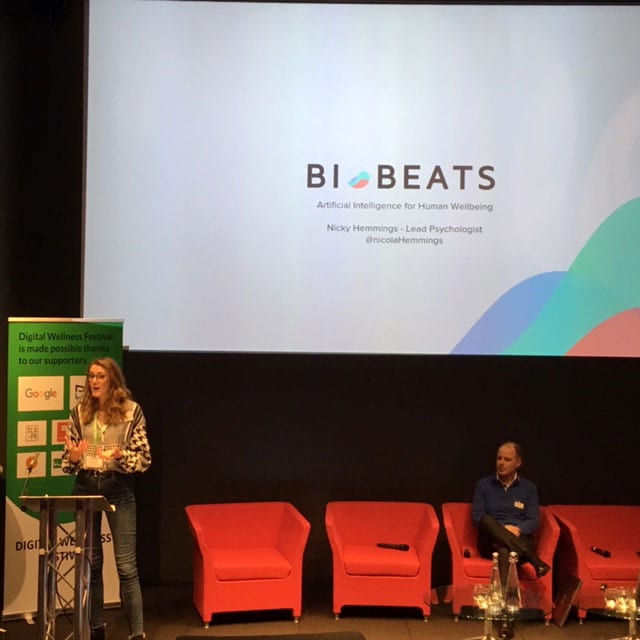
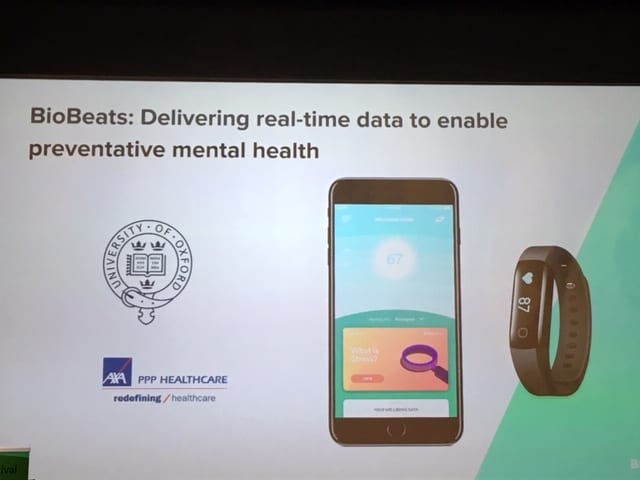
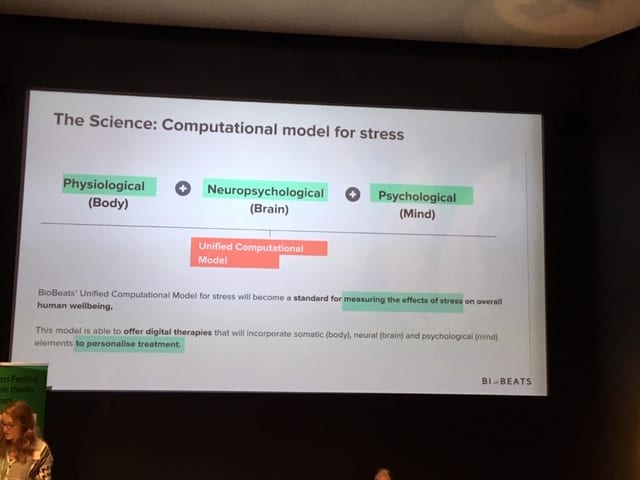
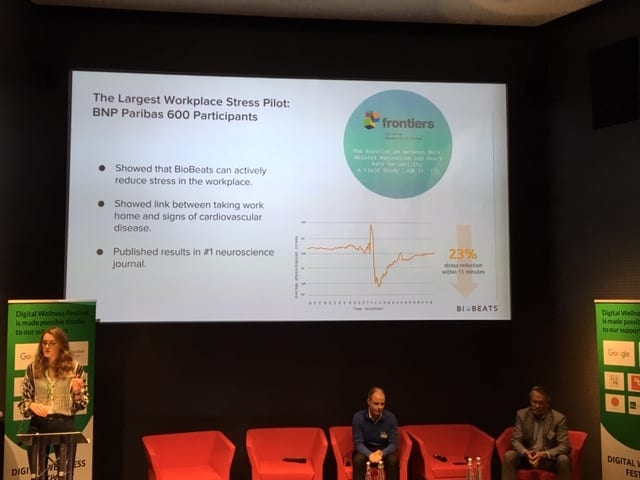
Panel 5: Georgie Powell (Space), Paul Marsden, Joanna Montgomery (Little Riot) Jonathan Garner (Mind Over Tech)
The panel focussed on some of the positive ways technology can impact wellbeing. Paul recommended ‘baking in’ positive psychological things into design and experience. The contrast between many countries’ idea of measuring their success with GDP versus Bhutan, who have a Wellbeing Index instead! The panel explored how technology is a tool, and used safely and appropriately it is a good thing.
Talk 8: Rohan Gunatillake (Buddhify)
Rohan shared his journey in developing the mindfulness app, Buddhify. I was impressed by his question “What if every interaction made people feel cared for?” The emphasis on consumer wellbeing rather than profit line appealed to me. The responsibility of companies given the highly personal and intimate nature of wellbeing products was acknowledged, and how popularity of a product develops a culture change, not just a change in individual behaviour – a theme bourne out elsewhere in smart phone-use statistics.
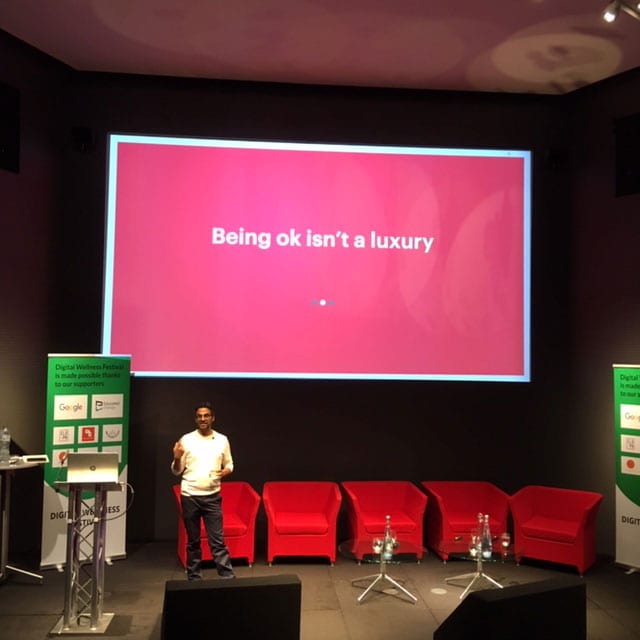
Talk 9: Peter Klein (Educated change)
A great insight into our changing behaviours and use of smart technology since the first iPhone was released (2007). For example, in just 10 years, screen time went from making up just a fraction of our day to dominating the majority of our personal time.
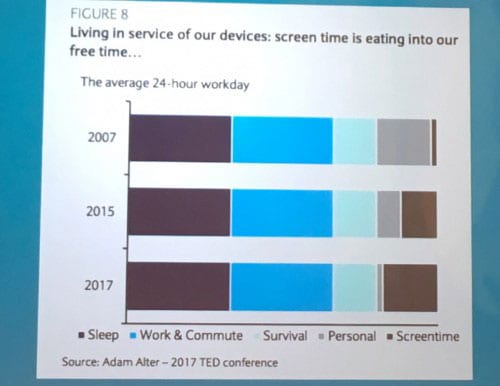
Talk 10: Kaiwei Tang (Light Phone)
Kai shared his journey in creating the light phone, a lightweight, business-card size simplified “dummy phone” that receives important forwarded calls from a user’s smart phone, enabling people to engage with work or the world around them, free from distractions. Calls forward from your smart phone, but notifications don’t get through. The focus is on real-world connections rather than digitally mediated ones, and the ethos carries through into the company’s policy not to advertise and use of outdoor photography instead of marketing copy in their social media.
Talk 11: Dr. James Williams (Oxford Internet Institute, Oxford University)
James talked about digital ethics, minimum viable morality, enhancing lives and doing positive projects which ‘bring light’ rather than those which block it out, entertainingly illustrated by delivering his talk under an umbrella. James used to work for Google and is fascinating. He is well worth checking out.
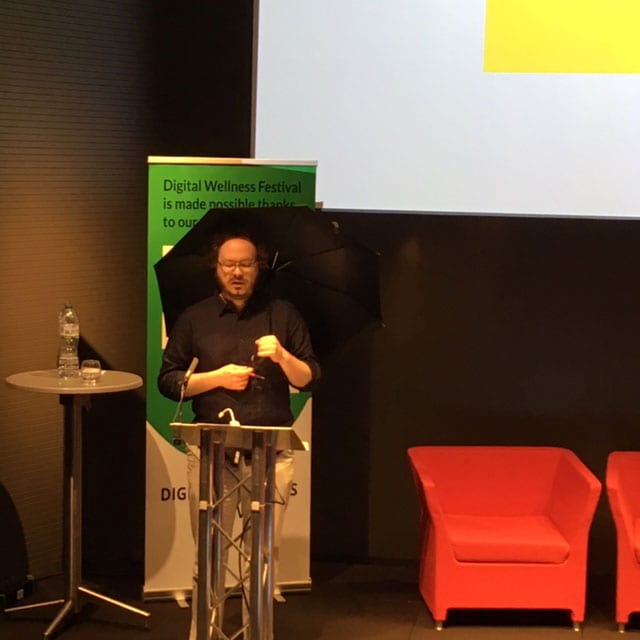
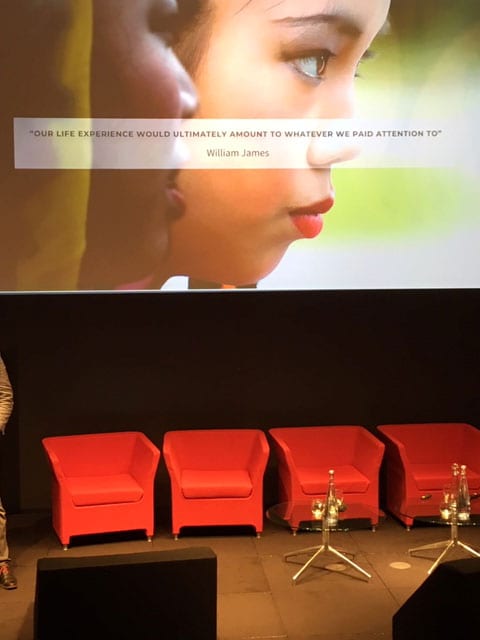
4 May 2019: Workshops
Workshop 1: Mind over Tech Team (Jonathan Garner)
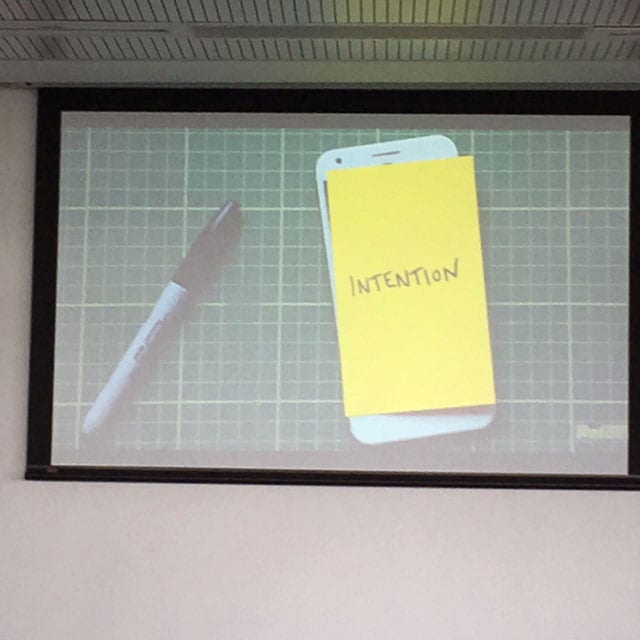
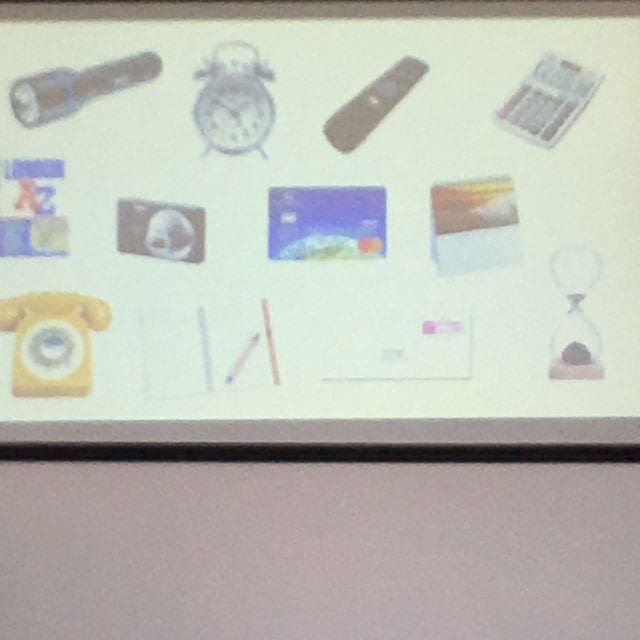
Workshop 2: Transformative Tech Team (Niraj Shah)
Workshop 3: Digital Wellness Collective (Nina Hersher, Gabi Jubran, Susan Reynolds)
What I took from the event
I am still digesting the impact of attending this event. I have an extensive reading list that ranges from ethics, psychology, neuroscience to business and Greek mythology! It was heartening to learn there is a community of people who are committed to wellbeing but are not anti-technology; striving to achieve a balance and fully conscious of their personal responsibility and the need to embody and apply ethical, human-centred practices.
Some companies take a different stance. Boundless Mind use knowledge of neuroscience, behaviour and AI to on the one hand offer companies a way to create more engaging (read ‘addictive’) apps, and on the other hand, subvert this same knowledge around gratification and reward, to break patterns for consumers around their habitual use of apps with Space. To me this moral “neutrality” is troubling and certainly causes me to question my own motives in wanting to harness behavioural science to improve results in my own work.
Conference Take Away Points for Reflection
- Is your digital activity something you will regret or feel better about later? The answer is an indicator of whether this activity is useful or not.
- If we fill every empty moment, we miss the opportunity to generate ideas or simply feel better.
- How we spend our days is ultimately how we spend our lives (the notion of time well spent versus a life of scrolling!)
- Variable rewards lead to increased frequency/levels of interaction – this is what hooks us into scrolling behaviour. See psychologist B.F. Skinner’s pigeon study for how positive reinforcement gets more complex when variable rewards are introduced
- “A hurt is at the centre of all addiction – the attempt to escape from pain is what creates more pain.” – Gabor Mate. Looking to technology to distract us from what ails us will not improve our wellbeing; we must address the underlying issue, however uncomfortable. Creating pockets of silence and stillness can connect us with our true needs.
- “How you make your work is as important as what you make.”
- Identify what you want to pay attention to. Where our attention goes to is how we construct our view of the world.
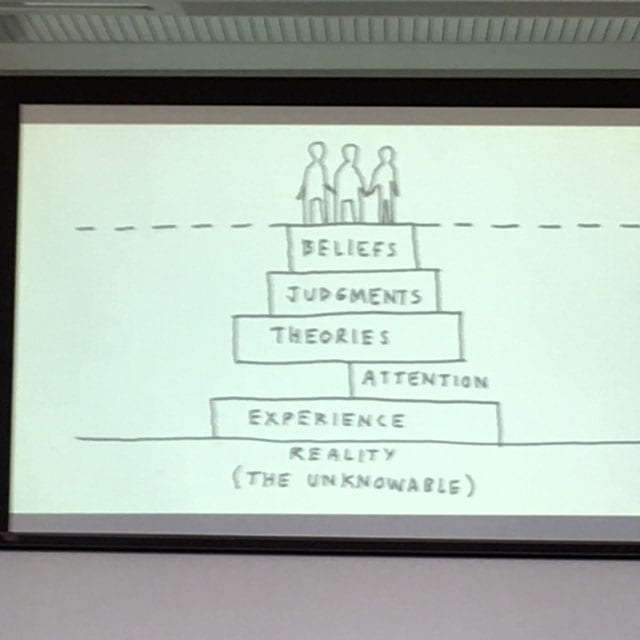
Digital Wellness Festival was an event in London 3-4 May 2019. It will be back again next year, and the event is suitable for anyone with an interest in wellbeing and working as a developer, digital designer, who is responsible for staff who work digitally or cares about the impact of technology on people. Find out more at Digital Mindfulness

